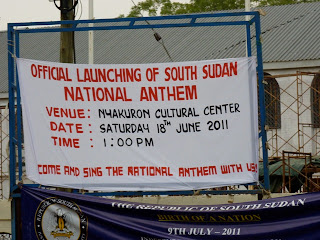In the morning I go on a walkabout of Juba. It's Sunday, and the markets are closed, but I like it this way. Juba is considered one of the fastest growing "cities" in the world--thanks to the influx of workers and NGOs. Five years ago, there was probably not much infrastructure because of the war and a century of neglect from the northern government, but things are now booming. The city is sprawled out with all the usual ministries, housing, a university, a few hospitals, and a stadium. The main roads are paved, but everything else is rutted dirt--or mud. In the corners here and there are squatters in abysmal shanties and refugees in the more structured edifices. People are exceptionally friendly and helpful. No one bothers me as I walk from one end of town to the other. Near the Bedouin restaurant and the goat market, I notice a woman in a pair of high heels, and I'm thinking "how the hell does she walk through the dirt and the mud with those on?" and then it strikes me she's a hooker. However, the real hub of activity today is at the churches--especially the episcopal church--where the singing and hallelujahs go on for twelve hours straight.
Over the days I am in Juba, the most interesting part is the other people at my guest house. Singular is Daniel, a Sudanese guy who always wears a full suit despite the humidity. He has lived for ten years in Denver, Colorado. Recently, he has been involved with the building of four schools in South Sudan. He finally told me the morning I left that he was one of the famous "Lost Boys of the Sudan." And in case you don't know the story, during the war with the North, thousands of orphaned boys--from toddlers to teenagers--banded together and walked a 1000 miles into Ethiopia, seeking refuge. And when they had to flee that country, they walked back into the Sudan and then into Kenya, where they languished until their story became known. Shortly before 9/11, Daniel was sent to Denver. He described this to me as like "the heavens opening up and an unimaginable miracle" was bestowed on him. Now he's finished a degree and is applying for a masters program--and building schools.
I decide to fly back to Uganda since I've seen what I wanted to see, and I hate backtracking. The airport is more chaotic than any bus station. People politely help you where you need to go, and all goes well until the immigration desk. They demand 90 Sudanese pounds ($45) for a "registration." I know what this is. If you enter the Sudan--and until July 9, this is still the Sudan--you have 72 hours to register with the police and pay this fee. I go into my best stupid, middle-age woman persona: "I don't understand; what am I registering for?" "I'm leaving, not coming." "This is so confusing." "What do you guys do with this money?" "Why didn't anyone tell me this at Nimule?" "If I left by bus do the border people charge this" "Tell me again where this money goes?" "Well, what are people supposed to do who spent the last of their money?" I keep this up until I catch the guys smiling at my patheticness. Then, I knew I had them. They stamped me out free of charge.
The plane to Entebbe takes off over the White Nile, and although I can't see through the clouds, we follow the river as it become the Albert Nile, the Victoria Nile, and we land along the shores of its source: Lake Victoria.








No comments:
Post a Comment